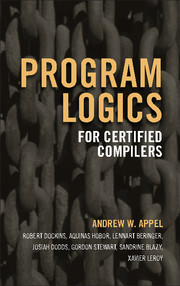Book contents
- Frontmatter
- Dedication
- Contents
- Road map
- Acknowledgments
- 1 Introduction
- I Generic separation logic
- II Higher order separation logic
- III Separation logic for CompCert
- IV Operational semantics of CompCert
- 31 CompCert
- 32 The CompCert memory model
- 33 How to specify a compiler
- 34 C light operational semantics
- V Higher-order semantic models
- VI Semantic model and soundness of Verifiable C
- VII Applications
- Bibliography
- Index
33 - How to specify a compiler
from IV - Operational semantics of CompCert
Published online by Cambridge University Press: 05 August 2014
- Frontmatter
- Dedication
- Contents
- Road map
- Acknowledgments
- 1 Introduction
- I Generic separation logic
- II Higher order separation logic
- III Separation logic for CompCert
- IV Operational semantics of CompCert
- 31 CompCert
- 32 The CompCert memory model
- 33 How to specify a compiler
- 34 C light operational semantics
- V Higher-order semantic models
- VI Semantic model and soundness of Verifiable C
- VII Applications
- Bibliography
- Index
Summary
In Part III we described program verification for C: tools and techniques to demonstrate that C programs satisfy correctness properties. What we ultimately want is the correctness of a compiled machine language binary image, running on some target hardware platform. We will use a correct compiler that turns source-level programs satisfying correctness properties into machine-level programs satisfying those same properties. But defining formally the interface between a compiler correctness proof and a program logic has proven to be fraught with difficulties. Resolving these difficulties is still the object of ongoing research. Here we will explore some of the issues that have arisen and report on the current state of the integration effort.
The two issues that have caused the most headaches revolve around understanding and specifying how compiled programs interact with their environment. First, how should we reason about the execution environment when it may behave in unpredictable ways at runtime? In other words, how do we reason about program nondeterminism? Second, how do we specify correctness for programs that exhibit shared memory interactions?
The first question regarding nondeterminism is treated in detail in Dockins's dissertation [38]. Dockins develops a general theory of refinements for nondeterministic programs based on bisimulation methods. This theory gracefully handles the case where the execution environment is nondeterministic, and it has the critical feature that it allows programs to become more defined as they are compiled.
Information
- Type
- Chapter
- Information
- Program Logics for Certified Compilers , pp. 272 - 287Publisher: Cambridge University PressPrint publication year: 2014
